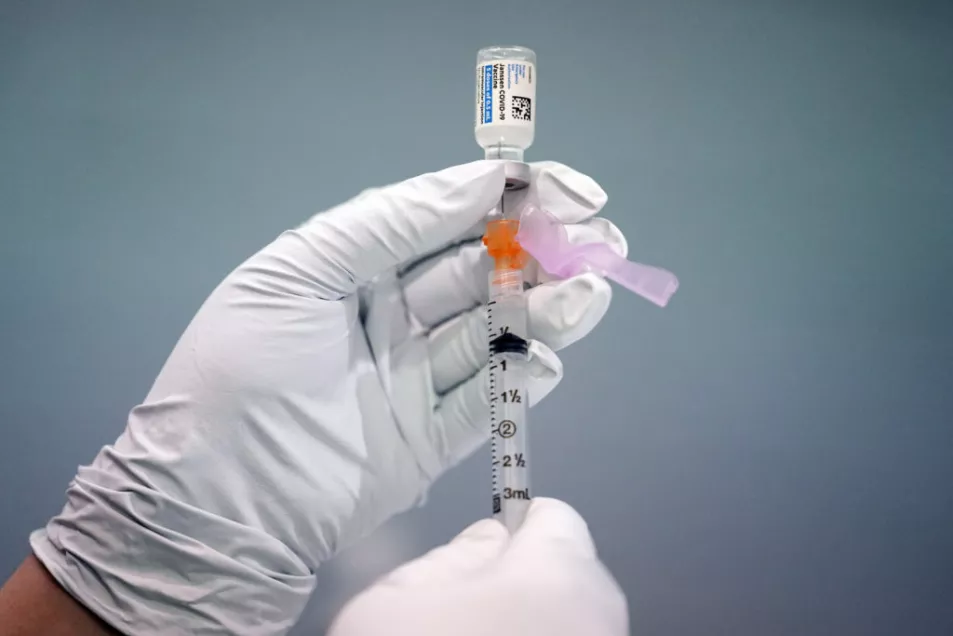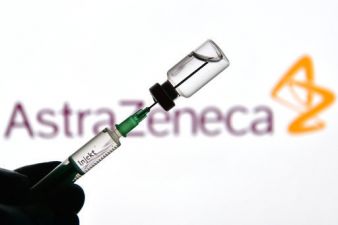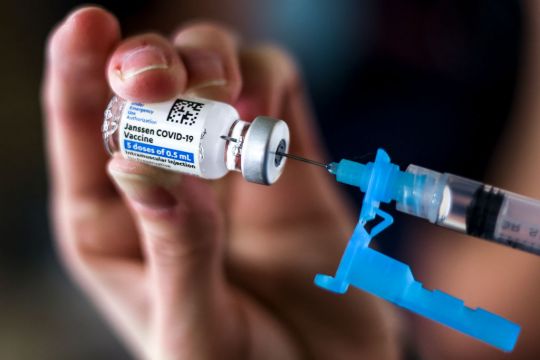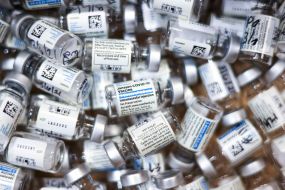US regulators have recommended pausing the use of Johnson & Johnson's Covid-19 vaccine, as they investigate rare blood clotting in six women.
J&J also said it was stopping the rollout of its vaccine in Europe.
The move comes after the European Union's medicines regulator earlier this month said it had found a possible link between AstraZeneca's Covid-19 vaccine and very rare blood clots in some adults who had received the shot.
Ireland's National Immunisation Advisory Committee (Niac) said the AstraZeneca vaccine “is not recommended for those aged under 60 years including those with medical conditions with very high or high risk of severe Covid-19 disease”.
The advisory body added that the AstraZeneca vaccine should be limited to those aged 60 and older.
Britain's health regulator, meanwhile, has recommended people under the age of 30 get an alternative Covid-19 vaccine, if possible, rather than the AstraZeneca shot.
Here's what we know so far:
What has happened?
With both the AstraZeneca and Johnson & Johnson (J&J) vaccines, the reports involve extremely rare clotting, including a type of blood clot called cerebral venous sinus thrombosis (CVST), that were seen in combination with low levels of blood platelets, called thrombocytopenia.
A US Centers for Disease Control and Prevention (CDC) committee plans to review the cases linked to the J&J vaccine, and the US Food and Drug Administration (FDA) will review its analysis.
The agencies, like their European counterparts, described the clotting as extremely rare.
The European Medicines Agency (EMA) has said its vaccine side effects monitoring system, as of April 4th, had received 169 reports of cases of CVST, or clots in blood vessels exiting the brain, and 53 cases of splanchnic vein thrombosis (SVT), or clotting in veins in the abdomen.
That's out of 34 million AstraZeneca vaccine doses administered in Britain and the European Economic Area over the past three months.
The EMA's safety committee carried out a review of 62 cases of CVST and 24 cases of SVT, of which 18 were fatal.
Most cases occurred within two weeks of the person receiving their first dose.
German vaccination officials, who recorded 29 cases of CVST in women aged 20 to 59 who received the AstraZeneca vaccine, said the occurrence rate in that group was 20 times higher within 16 days of vaccination than what would have typically been expected.
Germany's health ministry has said 1 to 1.4 cases of CVST would have been expected during that time.
The first Irish case of a very rare blood clot in a person after vaccination with the AstraZeneca vaccine is being investigated in a 40-year-old Dublin woman.
Who experienced the rare side effects?
In J&J's case, all six recipients were women between the ages of 18 and 48, and the symptoms occurred six to 13 days after vaccination. In total, more than 6.8 million doses of the Johnson & Johnson vaccine have been given in the United States through April 12th.
Similarly, most of the cases reported in Europe have occurred in women under 60, though that could be misleading, since Germany and Britain say more women got AstraZeneca's shot than men.
Most cases occurred within two weeks of people getting the first AstraZeneca dose.
What have the companies said?
J&J said it was working closely with regulators and noted no clear causal relationship had been established between the events and its shot.
AstraZeneca said it was “working to understand individual cases and “possible mechanisms that could explain these extremely rare events”.
What have regulators said?
The CDC is recommending pausing using J&J's single-dose vaccine “out of an abundance of caution” to ensure that the health care providers are aware of potential side effects and can plan for “proper recognition and management.”
Britain's Medicines and Healthcare products Regulatory Agency, meanwhile, made its recommendation for an alternative vaccine to AstraZeneca's to be used for people under 30 after reviewing 79 cases of rare clotting coupled with low platelets, with 19 fatalities – 13 women and six men. Eleven of the deaths were of people under the age of 50 and three were under the age of 30.

How do treatment recommendations differ?
In the United States, health officials said treatment of the blood clots with possible ties to the J&J vaccine differs from what might be considered standard in such situations.
“Usually, an anticoagulant drug called heparin is used to treat blood clots,” they said. “In this setting, administration of heparin may be dangerous, and alternative treatments need to be given.”
By contrast, German doctors and scientists investigating clotting associated with AstraZeneca shots have recommended that doctors give high concentrations of heparin, Fc receptor-blocking monoclonal antibody and intravenous immunoglobulin.
In Ireland, anyone who has been recently vaccinated with the AstraZeneca jab is asked to look out for the following symptoms:
- breathlessness
- pain in the chest or stomach
- swelling or coldness in a leg
- severe or worsening headache (particularly 3 or more days after vaccination)
- blurred vision
- persistent bleeding under the skin where there was no injury
- multiple small bruises, reddish or purplish spots, or blood blisters under the skin
How did regulators come to their decisions?
In its findings, the EMA said on March 18th that, on average, just 1.35 cases of CVST might normally have been expected among people under 50 within 14 days of receiving AstraZeneca's vaccine, whereas by the same cut-off date 12 cases had been recorded.
By comparison, four women out of 10,000 would get a blood clot from taking oral contraception.
British officials drew on statistics from the University of Cambridge's Winton Centre for Risk and Evidence Communication to explain their recommendations that young people get an alternative shot while older people can continue to get AstraZeneca's.
According to the Centre, the risk of serious harm due to vaccination falls the older people get and the number of admissions to intensive care units falls sharply thanks to vaccinations, boosting the AstraZeneca shot's benefit-to-risk ratio.
The Centre concluded that only 0.4 people for every 100,000 in the 50-59 age group would suffer vaccine-linked harm, while 95.6 intensive care admissions per 100,000 people would be prevented.
In Ireland, analysis of the age-specific risk of clotting events was inferred from UK data. In all scenarios considered by the Health Information and Quality Authority, the benefits associated in giving the AstraZeneca vaccine to all those aged over 60 years exceeded the risks of any clotting event.
What's the EU doing now?
The EMA, which said the benefits of using AstraZeneca's vaccine continue to outweigh any risks, said that unusual blood clots with low blood platelets should be listed as very rare side effects and countries should decide on how to proceed.
These may vary from nation to nation, the EMA said, depending on factors like infection rates and whether there are vaccine alternatives.
Ireland has decided to restrict the use of the AstraZeneca vaccine to the over-60s.
Some European countries had already decided to limit use of the J&J jab before the delay to rollout was announced – Spain had initially planned to use it for 70 to 79-year-olds.
Any theories on what causes the clots?

Among possible causes being investigated are that the vaccine triggers an unusual antibody in rare cases. So far, risk factors like age or gender have not been singled out.
German scientists at Greifswald University concluded in a paper published last week in the New England Journal of Medicine that the extremely rare cases of clotting with low platelets – something they are calling “vaccine-induced immune thrombotic thrombocytopenia” – are triggered by antibodies found in the affected patients following vaccination with AstraZeneca's shot.
A separate group of Norwegian scientists have made similar conclusions – that AstraZeneca's vaccine triggered an immune response that may have led to clotting in a small number of people – in their own article, also published in the New England Journal of Medicine.
Andreas Greinacher, an Greifswald expert on drug-induced immune responses, is, like the EMA, seeking clues about why in rare cases people developed clots and low platelets after getting the vaccine, while the vast majority did not.







